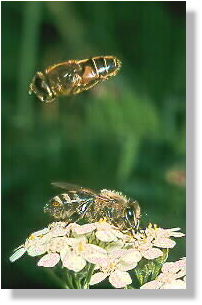 |
The Latin name of the order, that
hover-flies belong to is "Di-Ptera". It means "two
wings" and describes, that True Flies or Two-winged Flies in
contrast to bees and wasps have only one pair of wings. The original
second pair in the run of evolution developed into balancers, which
are also called "halteres".
These club-shaped organs are equipped with balance and monitoring senses, by which the flies control their wing flaps and their direction. If the balancers get damaged or even lost, hover-flies loose their ability to fly. In this picture, the male of the hover-fly Eristalis arbustorum is looking for a mate, displaying and hovering above her. But he pays his court to a wrong bride. She is a female of a different species: a honey-bee. You can recognize her by her narrow eyes, her furry chest and belly. In the real situation, the male realized his error and did not try to mate with this armed female. By his approach, he was taken in by his own dodge. Being completely unprotected and well tasting to their predators, by color and by body structure hover-flies imitate armed insects such as bees and wasps. Eristalis arbustorum imitates honey-bees. |